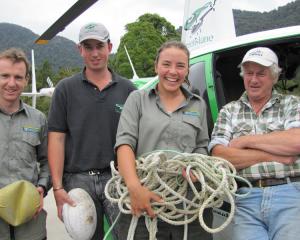As a new gardener herself, Otago Daily Times reporter Edith Schofield spent a couple of fruitful hours chatting to long-time Otago vegetable gardeners, discovering not only why her runner beans were not producing beans but picking up other great ideas for those starting their own vege patch.
Here are the the top ten tips from the sage advice she gathered.
1. Start simple
Stick to vegetables which are easy to grow and remember a small garden can provide as much produce as a big plot if it is carefully planted and managed.
If you are breaking in new ground, potatoes are a great crop to start with, as the growing tubers break up the soil and it is disturbed again when the potatoes are dug.
2.Timing is everything
Some vegetables are ready in weeks, while others take up to eight months to mature.
If you plant vegetables at the wrong time, they either won't germinate, won't grow or will rapidly bolt and go to seed.
Some traditional gardening dates include planting onions on St Patrick's Day, in March, broad beans on Anzac Day in April and garlic on the shortest day of the year in June.
Labour weekend is generally the right time to start planting most of the garden in spring.
If crops are started early, you may be able to double-crop.
St Leonard's gardener and former Otago Daily Times garden columnist Dick Turvey plants his first potatoes in May, digs them in about November and plants a second crop to have more new potatoes ready to eat again in Easter.
3.Winter gardening is great
Many people miss out on winter gardening, yet this is the time when vegetables are often at their most expensive in the shops.
Plant the right vegetables at the right time and your garden can be providing you with cauliflowers, cabbages, silverbeet, leeks and brussels sprouts throughout the coldest months of the year.
Winter vegetables should be planted in January.
4.Little and often
It can be disheartening to be throwing good veges in the compost bin because you can't eat everything when it is all ready at once.
Small, regular sowings or plantings can be more successful, and when you take one crop out, put another one in.
If you only have a small family, consider buying mixed punnets of vegetables, rather than six of everything, and if using seeds sow a small pinch - you don't need to use the whole packet in one go.
5.Feed the soil
Organic matter is great for the garden to renew and replenish the soil, and a lot of it can be collected for free.
Seaweed, which is full of minerals, animal manure and pine needles are just some examples.
Making your own compost is a great way to recycle kitchen scraps instead of sending them all to the landfill.
Compost is made by bacteria and fungi and the three key points to remember are that they need air, moisture and nutrition to do their job.
6.The art of watering
"Plants need watering when they need watering," is the best advice most gardeners can give. Observation is the key to watering.
Keep an eye on how dry the soil is and observe plants - they will tell you when they need a drink.
Overwatering is not good for plants, either.
Often people don't water until there is a prolonged dry period, but this can cause vegetable plants to bolt and go to seed.
Plants, such as rhubarb, celery, leeks and beans like plenty of water.
7.Easy big beans
Broad beans will grow in any condition, anywhere in Otago. Plant them in autumn and they will be the first vegetable to harvest in the new season.
8.Runner secrets
To get a good crop of runner beans, plant flowers among them to attract bees to pollinate the bean flowers.
Water the flowers every two or three days to "set" them, otherwise they tend to drop off, resulting in no beans.
9.Shift things around
Rotate crops to give them the growing conditions they like. Plants such as potatoes like lots of compost, but root crops, such as carrots and parsnips, will start to fork and twist if the soil is too rich.
Traditional rotation follows a potato crop with greens, which are followed by beans and then back to potatoes.
Taieri gardener, horticulturalist and former garden columnist Neville Struthers alternates his garden every year.
On one half he adds lots of compost and plants potatoes, while the other half is planted with greens and root crops and then switched the following year.
Once the potatoes are dug, winter vegetables are planted in the space where they were growing.
10.Learn from others
Talk to gardeners in your neighbourhood to learn their secrets and what grows best in your area.
For example, sweet corn, French beans and tomatoes can be a marginal crop in Dunedin unless you have a particularly sunny and sheltered spot, but cherry tomatoes often grow well outdoors in Central Otago.




